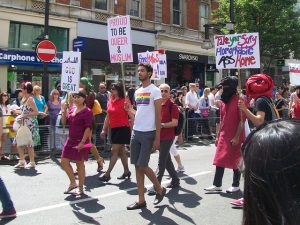By E.A. Sofia
Every so often, there is a news story about persecution against LGBTQ (Lesbian, Gay, Bisexual, Trans and Queer) people in Muslim-majority countries or a poll on Muslim views on social issues. The resulting conversations are all too often derailed and the topic of the conversation changed to non-Muslims’ views on Islam. This derailment is convenient for those who wish to avoid the long-overdue conversation that’s needed about how Islamic views affect the lives of LGBTQ people. As Muslims are a minority in the West, there’s a desire to be seen as tolerant to challenge negative stereotypes.
The problem is that this desire to be seen as tolerant has not been matched with a willingness to listen to internal criticism from those who face bigotry within Muslim communities. LGBTQ Muslims and ex-Muslims are silenced and their experiences are not considered important in conversations about justice. There has been a lot of anti-Muslim bigotry in recent years, yet other types of bigotry did not magically disappear. Being told to stay silent and wait starts to feel like a tactic to delay the conversation indefinitely.
The standards of what counts as favouring equality have been set too low, in an effort to both preserve tradition and preserve the image of Islam. The bare minimum of decency is counted as pro-justice. Many Muslims have LGBTQ classmates, co-workers, and acquaintances with whom they may be friendly; and most Muslims would never dream of hurting them.
However, how many believe that being LGBTQ is morally acceptable? How many would be fully affirming if their family members came out? These are the questions that we have to be willing to ask, especially of community leaders and parents who would attempt to paint their opposition as a cultural difference that should be tolerated.
The arguments of “cultural difference” and the importance of staying ‘true to one’s own culture’ are often invoked in these conversations. Some go so far as to say that their version of Muslim culture is superior, but others seem to have a tolerant view, with no interest in imposing their culture on others. There are those who believe that everyone has their own culture, and while others can follow their own culture, we have to follow ours. This seems accepting on the surface, until realising that this view of “cultural difference” is also sometimes applied as justification for opposing social justice.

There are arguments from conservative Muslims that actually (perhaps unintentionally?) agree with the view of the people promoting anti-Muslim bigotry.
Conservative Muslims argue that it’s acceptable for Muslims to continue to be against LGBTQ equality, even if, and when, other communities become affirming, because it’s part of our culture. They portray conservatives as the ones who are bravely preserving tradition.
This sets up a narrative that allows conservative Muslims to demonise LGBTQ people as an Other that’s persecuting Muslims, rather than acknowledging the severity of persecution that LGBTQ people face. Mainstream Islam and culture has participated in this persecution and this needs to be acknowledged and addressed.
I feel the need here to also defend LGBTQ people from non-Muslim backgrounds: the attitude that treats being LGBTQ as a “white” or “Western” concept which non-Muslims are trying to force onto Muslims is a misrepresentation of the status of LGBTQ rights in non-Muslim communities.
This argument takes a persecuted minority group and falsely sets them up as being beloved to such a degree that white, non-Muslim Westerners would evangelize for them. But there are people of Western, non-Muslim backgrounds who oppose LGBTQ rights.
People of various different backgrounds have agreed on this bigotry, and opponents of equality on LGBTQ issues have referenced people with similar views in other religions and cultures to claim that their opposition is universal human morality. All cultures, including the Islamic culture, must change to become more just.
We need to stop accepting efforts to derail conversations on Muslim views on social justice issues. This is not a matter of doing public relations to improve the image of Islam. Acknowledging that a discriminatory view is common, rather than rare, is an important first step to addressing the problem. The people who are hurt by Muslim anti-LGBTQ views are just as real and just as important as people who are hurt by anti-Muslim bigotry, and the bigotry against them is systemic as well. In fact, there are people who face both of these types of discrimination.
Discussing this topic from a standpoint of only caring about anti-Muslim bigotry while disregarding anti-LGBTQ bigotry misses the point and leaves people who are hurting without friends and allies. There are real people reaching out and asking to be heard, and telling them to wait indefinitely asks them to forfeit their happiness, rights, and lives in the name of preserving tradition. Changing culture and tradition is preferable to asking people to make those sacrifices.

E.A. Sofia is a fangirl living in the USA who writes about books, social justice, and secularism. Through her writing, she aims to share her love of stories, raise her voice on issues affecting people of Muslim backgrounds, and try to do her part to help others. She ultimately has hope for a better future.
Follow her on Twitter.

